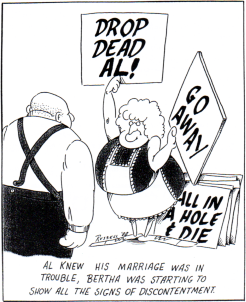 by Flip Michaels
by Flip Michaels
"When you stop learning, you're dead."
It's true. One should strive to learn something every day. So today, I took a giant leap of knowledge. Really.
After a day of dealing with complete emotionally maladjusted people, I saw that if there was anything about my job, about myself that I'd like to improve drastically, it would have to be communication.
Day in day out, we the CREATIVE, communicate with a great deal of people: General Managers, Sales Managers, Account Executives, Program Directors, Business & Traffic Directors, D.J.'s, producers, assistants, etc.. A failure in communication can be a very dangerous catalyst to any situation. Without the necessary skill of communication, we could be in the midst of deep trouble.
COMMUNICATION: The skill of communication begins within. Good communication within oneself is essential. And, once achieved, that person can communicate more freely and effectively with others.
Through research and my own mistakes in communicating, I've found that there is one main obstacle to communication: people's tendency to evaluate. Fortunately, if we can learn to listen with understanding, we'll prevent those evaluative impulses and improve our communication with others.
THE BARRIER: We all have that urge to judge, evaluate, and approve (or disapprove) the other person's statement. Suppose a reader, commenting on my column, says, "I didn't like what Flip said." How will you respond? Your reply will be either of approval or disapproval of the attitude expressed. Either you respond, "I thought it was terrible," or else you say, "Oh, I thought it was really interesting." In other words, your first reaction would be to evaluate it from your point of view.
Or suppose I say, with some feeling, "I think that was a great commercial." What is your first reaction? Most likely, evaluative. You'll find yourself agreeing or disagreeing, perhaps making a judgment about me such as, "He must be a real sick person to like that commercial," or "He seems solid, intelligent in his thinking."
Although making these evaluations in our conversation is very common, you'll note, the reaction is heightened in situations where feelings and emotions are deeply involved. Therefore, the stronger the feelings, the less likely it is that there will be a mutual element in the communication. Just two ideas, feelings, or judgements missing each other in (SFX: laser; reverbed voice) "psychological space."
Next time an argument breaks out near by, check it out! You'll probably go away thinking, "they weren't even talking about the same thing!" And if it was a heated battle, you'll probably be right. Each person made a judgement, an evaluation, from a personal frame of reference. There was really nothing you could call communica-tion. And this impulse to evaluate someone's statement from our own point of view is what blocks interpersonal communication.
THE GATEWAY: We can achieve real communication and avoid this evaluative tendency when we listen with some understanding. Yes, understanding (which until recently, I never fully considered). This means seeing the "expressed idea" and "attitude" from the other's point of view -- sensing how it feels to the person, reaching his or her frame of reference about the topic being discussed.
I know. It sounds absurdly simple, but IT IS NOT. In fact, if you think that you listen well, try this out! Test the quality of your understanding. The next time you get into an argument with your spouse, friend, or small group of friends, stop the discussion for a moment and suggest this rule: Before each person speaks up, he or she must first restate the ideas and feelings of the previous speaker accurately and to that speaker's satisfaction.
You see what this would mean. Before giving your own personal view, you would first have to achieve the other's frame of reference. Try it. You'll find it to be one of the most difficult things to do. And even if you're able to do it, your comments will be drastically revised. But you'll also see that the emotions begin to settle, differences are reduced, and what remains is rational and understandable.

SUMMARY: It seems to be evident that a better understanding of the other person's point of view in turn can help you communicate better. My partner in crime, Vance Russell, gave me the Al/Bertha Syndrome as illustrated. Thanks Vance. And I'll leave you with this doctor-patient joke that gives another humorous prospective.
DOCTOR: Mr. Michaels, I'm sorry, but you have only three weeks, 2 hours and 36 seconds left to live starting now! (SFX: timer clicks)
FLIP: Doc, you've got to understand...I want a second opinion.
DOCTOR: O.K., Mr. Michaels....and you're ugly too!
♦
